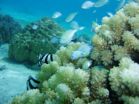(Press-News.org) Increasingly humanitarian organizations will find themselves responding to health emergencies provoked by the adverse effects of mining and other extractive industries, setting up a potential clash to do with the core principles and values at the heart of humanitarian medicine, writes Philippe Calain from the humanitarian medical organization, Médecins Sans Frontières (MSF), in this week's PLOS Medicine.
"A pragmatic approach of engagement with the corporate sector for the delivery of aid, or an implicit support to mainstream development agendas could compromise the legitimacy of humanitarian medicine," argues Calain. He continues, "A principled understanding of humanitarian medicine entails selfless moral commitments that are incompatible with the for-profit objectives of corporate industries."
Drawing on MSF's experience responding to the "worst lead poisoning epidemic in modern history" resulting from artisanal gold mining in Nigeria's Zamfara state, Calain explores the pitfalls, difficult alliances, and challenges medical humanitarian organizations must navigate in confronting the dire health consequences resulting from extractive industries, whether informal, illegal, or sanctioned.
He argues that, in developing countries, extractive industries (including ore mineral mining and oil extraction) have far reaching consequences on health through environmental pollution, communicable diseases, violence, destitution, and compromised food security. While humanitarian organisations might be called to intervene in areas occupied by the extractive sector, Calain argues that oil and mineral exploitation reveals a fundamental clash of values between humanitarianism, the for-profit sector, and privatised global philanthropy.
Operating in this relatively new terrain for medical humanitarian organizations – outside the traditional humanitarian response to armed conflict, epidemics, and natural disasters – requires a deeper examination of which types of compromises and alliances are acceptable. Responding to these kinds of emergencies, warns Calain, cannot be reduced to the development of medical and technical expertise alone.
"While advocacy and expansion of their operational expertise are obvious paths for non-governmental organizations, a more complex and ideologically loaded question to solve is about what type of relationships humanitarian organisations should entertain with the corporate sector," writes Calain. "Specific medical humanitarian organisations can respond to these challenges in different ways, based on their position between pragmatic or principled approaches, and their willingness to develop new technical capacities."
According to Calain, many mainstream medical humanitarian organisations would rather opt for no engagement with the natural resource extraction sector due to questions of values and conflicts of interest.
He concludes: "the Zamfara outbreak has called attention to a novel agenda for medical humanitarian organisations, including technical preparedness for environmental disasters, dialogue with international environmental organisations, and a better understanding of the exact role of resources extraction in perpetuating humanitarian crises."
INFORMATION:
Funding: No specific funding was received for writing this article.
Competing Interests: The author has declared that no competing interests exist.
Citation: Calain P (2012) What Is the Relationship of Medical Humanitarian Organisations with Mining and Other Extractive Industries? PLoS Med 9(8): e1001302. doi:10.1371/journal.pmed.1001302
IN YOUR COVERAGE PLEASE USE THIS URL TO PROVIDE ACCESS TO THE FREELY AVAILABLE PAPER (THIS LINK WILL BECOME LIVE WHEN THE EMBARGO LIFTS):
http://www.plosmedicine.org/article/info%3Adoi%2F10.1371%2Fjournal.pmed.1001302
CONTACT:
Philippe Calain
Unité de Recherche sur les Enjeux et Pratiques Humanitaires (UREPH)
Médecins Sans Frontières, Genève, Switzerland
philippe.calain@geneva.msf.org
END
In their August editorial, the PLOS Medicine Editors reflect on a recent Policy Forum article by Jason Corburn and Alison Cohen*, which describes the need for urban health equity indicators to guide public health policy in cities and urban areas. The Editors focus on the need for better air quality data for the world's cities because many cities with the worst airborne particulate levels are in low- and middle-income countries and often have limited data. Worryingly, the World Health Organization estimates that 1.34 million premature deaths were at attributable to outdoor ...
Child mortality is a key indicator not only of child health and nutrition but also of the implementation of child survival interventions and, more broadly, of social and economic development. Millennium Development Goal 4 calls for a two thirds reduction in the under-five mortality rate between 1990 and 2015. With the renewed focus on child survival, tracking of progress in the reduction of child mortality is increasingly important. A sponsored collection of new articles on the methodology for estimation of child mortality was published today in the open-access journal ...
Researchers at the University of Hawaii – Manoa (UHM) School of Ocean and Earth Science and Technology (SOEST) made a discovery that challenges a major theory in the field of coral reef ecology. The general assumption has been that the more flexible corals are, regarding which species of single celled algae (Symbiodinium) they host in coral tissues, the greater ability corals will have to survive environmental stress. In their paper published August 29, 2012, however, scientists at the Hawaii Institute of Marine Biology (HIMB) at SOEST and colleagues documented that the ...
Scientists have taken a step closer to solving one of life's mysteries – why family size generally falls as societies become richer.
Evolutionary biologists have long puzzled over this because natural selection is expected to have selected for organisms that try to maximise their reproduction. But in industrialised societies around the world, increasing wealth coincides with people deliberately limiting their family size – the so-called 'demographic transition'.
In a study published in Proceedings of the Royal Society B: Biological Sciences, researchers from the London ...
Astronomers at the International Astronomical Union meeting announced the discovery of the first transiting circumbinary multi-planet system: two planets orbiting around a pair of stars. The discovery shows that planetary systems can form and survive even in the chaotic environment around a binary star. And such planets can exist in the habitable zone of their stars. "Each planet transits over the primary star, giving unambiguous evidence that the planets are real," said Jerome Orosz, Associate Professor of Astronomy at San Diego State University and lead author of the ...
Fort Davis, Texas — NASA's Kepler mission has found the first multi-planet solar system orbiting a binary star, characterized in large part by University of Texas at Austin astronomers using two telescopes at the university's McDonald Observatory in West Texas. The finding, which proves that whole planetary systems can form in a disk around a binary star, is published in the August 28 issue of the journal Science.
"It's Tatooine, right?" said McDonald Observatory astronomer Michael Endl. "But this was not shown in Star Wars," he said, referring to the periodic changes ...
There are more than 400,000 species of beetles and only two species of the tuatara, a reptile cousin of snakes and lizards that lives in New Zealand. Crocodiles and alligators, while nearly 250 million years old, have diversified into only 23 species. Why evolution has produced "winners" — including mammals and many species of birds and fish — and "losers" is a major question in evolutionary biology.
Scientists have often posited that because some animal and plant lineages are much older than others, they have had more time to produce new species (the dearth of crocodiles ...
Gravitational waves, much like the recently discovered Higgs boson, are notoriously difficult to observe. Scientists first detected these ripples in the fabric of space-time indirectly, using radio signals from a pulsar-neutron star binary system. The find, which required exquisitely accurate timing of the radio signals, garnered its discoverers a Nobel Prize. Now a team of astronomers has detected the same effect at optical wavelengths, in light from a pair of eclipsing white dwarf stars.
"This result marks one of the cleanest and strongest detections of the effect of ...
VIDEO:
An animation of satellite observations from August 26-28, 2012 shows Tropical Storm Isaac moving past the Florida Keys and into the Gulf of Mexico, nearing landfall in the U.S. Gulf...
Click here for more information.
NASA satellites have been providing valuable data to forecasters at the National Hurricane Center watching the development and progression of powerful Tropical Storm Isaac as it heads for landfall.
The Moderate Resolution Imaging Spectroradiometer ...
Eyewitness identification evidence is often persuasive in the courtroom and yet current eyewitness identification tests often fail to pick the culprit. Even worse, these tests sometimes result in wrongfully accusing innocent suspects. Now psychological scientists are proposing a radical alternative to the traditional police lineup that focuses on eyewitnesses' confidence judgments.
In a new article forthcoming in Psychological Science, a journal of the Association for Psychological Science, Neil Brewer of Flinders University and colleagues report a new type of lineup ...




